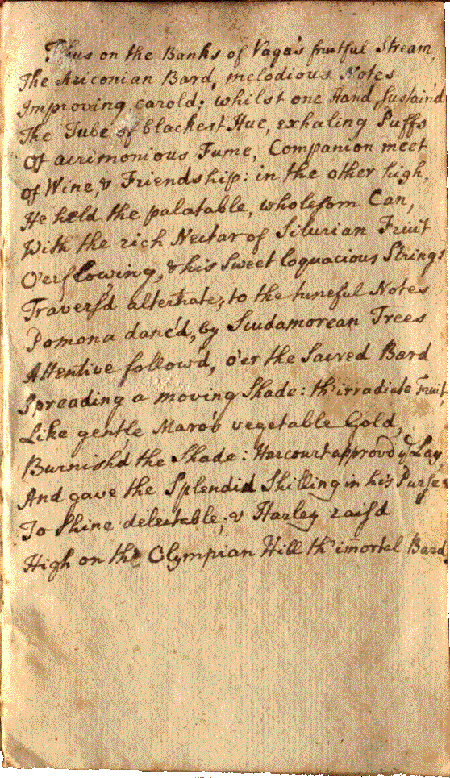
Facsimile of manuscript leaf in
John Philips, Poems on Several Occasions,
4th ed. (London, 1728).
 |
|
Thus on
the Banks of Vaga's fruitful Stream, |
Restoration and eighteenth-century readers frequently scribbled notes or marginalia, relevant to their reading, in the books that they owned. These might often consist of little more than single word commentaries, inscribed at an appropriate place in the margins, on a passage in the work, but might frequently be a great deal more elaborate as well. Blank pages, endpapers, and fly-leaves were frequently used to transcribe biographical or bibliographical notes on the work or author, and might, as in this case, be employed as well to add interesting or germane verses to the book.
On occasion, book owners might have a printed work bound or interleaved with blank gatherings of sheets upon which they might themselves supplement the contents of the work with transcriptions of their own; a famous case of this is Bodleian MS. Eng. poet. d.49, a copy of Andrew Marvell's Miscellaneous Poems (1681), complete with manuscript corrections, and bound together with several gatherings of blank sheets containing a number of Restoration verse satires, some by Marvell.
Blank pages or leaves in printed books were sometimes used for other purposes as well. Paper was relatively expensive in the Restoration and eighteenth-century, and usually comprised the chief expensive in printing books. For this reason, there was a tendency in the period to economize by employing any spare paper for notes, letter, recipes, and anything else that might need to be written. In one copy of Swift's Works (in 8 vols., Edinburgh, 1757), the fly-leaf of volume VII includes the following handwritten formula for a cleaning solution, probably for brass or copper ("Bath-brick" being a form of lime frequently used for this purpose):
Pound a quarter of a pound of Allum very
fine, add to it a pint & half of new Milk
& boil it till dissolved & when cold use it
with Bath Brick & and a very hard Brush
& spunge it off with cold water. —
The unidentified verses to Philips transcribed above imitate the mock-Miltonic diction and tone that Philips himself pioneered in his most popular poem, The Splendid Shilling (1701), and allude, through their references to a quasi-pastoral setting, to Philips' interest in the Georgic, which he adapted to English country life in Cyder (1708).
Reproduced from back fly-leaf of copy of:
| Poems on Several Occasions. By Mr. John Philips, Student of Christ-Church, Oxon. The Fourth |
|
|
|
ESTC: t042621 |
Transcribed and edited by Mark McDayter.
 |
Website maintained by: Mark
McDayter
Website administrator: Mark McDayter
Last updated: April 25, 2002
Notes
Vaga] The
Wye River, probably after the Roman name for the city of Wye.
Ariconian Bard] I.e., John Philips. Ariconian: "Ariconian" is derived from Ariconium, the name of a Roman town in the Wye Valley, near present-day Gloucester. M. G. Lloyd Thomas suggests that Philips probably believed the site of Ariconium to be present-day Kenchester (The Poems of John Philips, The Percy Reprints 10, ed. M. G. Lloyd Thomas (Oxford: Basil Blackwell, 1927) 100). See Philips' Cyder (1708), Bk. I, ll. 7, 179, 480, 541.
carold] I.e., "carolled," or sung.
Tube of blackest Hue] A pipe for smoking tobacco, here described in the kind of mock-Miltonic paraphrasis for which Philips himself was famous. Philips was renowned for his enjoyment of smoking: Samuel Johnson, in his "Life" of Philips, notes, following earlier biographers, that he celebrated tobacco in all of his poems except his panegyric Blenheim.
Silurian Fruit] I.e., apples from the south-eastern parts of Wales, an area once inhabited by the ancient tribe known as the Silures. See Philips' Cyder (1708), Bk. II, l. 89, in which "Silurian Cyder" is particularly praised.
Pomona] Roman deity associated particularly with fruit.
Scudamorean] The Scudamores were a prominent family who owned much of the property in the vicinity of the parish of Kentchurch. Philips knew the Third Viscount Scudamore from his time at Christ Church, but the allusion here is more probably to the first Viscount, John Scudamore (1601-1671), who was a famous horticulturalist, and was associated with a variety of apple ("Scudamore's Crab"). See The Poems of John Philips, The Percy Reprints 10, ed. M. G. Lloyd Thomas (Oxford: Basil Blackwell, 1927) 98-99, and Philips' Cyder (1708), Bk. I, l. 506.
Maro] The Roman poet Virgil; the reference here is particularly to his Georgics.
Harcourt] Simon Harcourt (1684-1720) was the second son of the first Viscount of that name; he attended Christ Church at the same time as Philips, and became, apparently, a close friend and supporter of the poet. It was Harcourt who arranged for the erection of a memorial to Philips in Westminster Abbey upon the latter's death.
Splendid Shilling] An allusion to Philips' short mock-Miltonic poem, The Splendid Shilling (1701).
Harley] Robert Harley, future Earl of Oxford (1661-1724), and an important Tory minister and literary patron. Philips dedicated his celebratory poem Blenheim (1705) to Harley; that piece had, in a sense, been "commissioned" by Harley and his colleague, Henry St. John, as a Tory rejoinder to Joseph Addison's The Campaign, a Whiggish celebration of the Duke of Marlborough's victory over the French.